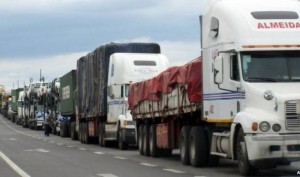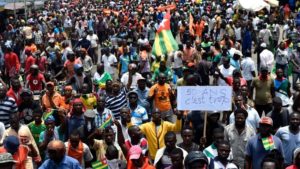
After a lot of disappointments in its free trade promotion efforts, the Economic Community of West African States (ECOWAS) is hoping to rely on the reputation of some seven eminent persons to whip members into line and break down the barriers that stand in the way of intra-regional trade.
Headed by Former Nigerien President, Sem Djibo Salou, and supported by USAID, a newly formed Task Force on the ECOWAS Trade Liberalisation Scheme is expected to take up the concerns of businesses with member countries that are found to be working against the effort to abolish custom duties and non-tariff barriers in the sub-region.
“The role of this task force is to deal with all the difficulties we notice in the sub-region,” Salifou Tiemtore, Director of Customs at the ECOWAS Commission told the B&FT in Accra yesterday, at the first meeting of the Task Force, slated for August 11 and 12,2016.
“For example, they can come into a country and discuss with politicians at the highest level how they can better implement ECOWAS regulations.
You know, according to ECOWAS regulations, internal trade does not have to encounter any problem; trade along the corridor has to move freely. So when we notice this kind of thing we will discuss with authorities of the country concerned how to remove the problem,” he said.
ECOWAS, he said, has already done “some preliminary work” on the state of play in each country, to identify the barriers each country is refusing to let go, and that the report has been handed over to the Task Force.
“For example, before the end of the year, they are supposed to go to four countries – Burkina Faso, Liberia, Benin and Nigeria – and they have a list of problems, and they are going to discuss with the authorities how to remove these difficulties,” Mr Tiemtore said.
President of the ECOWAS Commission, Marcel Alain de Souza of Benin, attended the first meeting of the Task Force, where he demanded “concrete action” from the seven-member body.
He asked the Task Force, which has Ed-Richard Kuma Lanyon, former CEPS Commissioner, as Ghana’s representative, to balance the need for free trade with the need to check the increasing security threat the sub-region faces.
Marcel de Souza expressed concern over the unyielding attitude of some member countries which has held back realization of the objectives of the ECOWAS Trade Liberalisation Scheme (ETLS), which is the main ECOWAS operational tool for promoting the West Africa region as a Free Trade Area.
The scheme first came into existence in 1979 where agricultural, artisanal handicrafts and unprocessed products were agreed to benefit.
Later on, other industrial products were approved, but this made it imperative to define what products were “originating” from the ETLS region, since some member countries complained that they were being sent goods that were imported from other parts of the world and made to seem they were manufactured within the region.
Goods that qualify under the scheme include wholly produced goods; goods whose raw materials completely originate from the region and goods which are not wholly produced but their production requires the exclusive use of materials which are to be classified under a different tariff sub-heading from that of the product.
Also included are goods which are not wholly produced but their production requires the use of materials which have received a value added of at least 30% of the ex-factory price of the finished goods.
Benefits under the scheme include exporters retaining 100% of export proceeds, tax rebate of between 40% and 75% for agricultural exporters and bonded warehousing without duty.
The scheme also operates alongside the duty draw back scheme and enables exporters enjoy 100% duty exemption on selected imports intended to go into production for export.
B&FT





